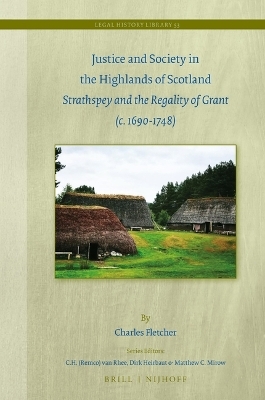
Justice and Society in the Highlands of Scotland
Martinus Nijhoff (Verlag)
978-90-04-47251-8 (ISBN)
Charles Fletcher, Ph.D. (2019), University of Edinburgh. His main fields of interest are the culture and history of the highlands of Scotland and Scottish legal history.
Preface
Acknowledgements
List of Illustrations
Conventions and Abbreviations
Glossary
1 Introduction
1.1 Heritable Justice in Scotland
1.2 Seigneurial Justice: Scotland in European Context
1.3 The Regality of Grant
2 The Clan Grant and the Regality Court
2.1 Strathspey in the Early Eighteenth Century
2.2 The Lairds of Grant, the Fine and the Regality Court of Grant
2.2.1 The Lairds of Grant
2.2.2 Bailies of the Regality of Grant
2.2.3 The Fine of Clan Grant: John Grant of Dalrachney
2.3 Conclusion
3 The Regality Court and Its Procedures
3.1 Court Officials
3.1.1 Clerks of the Court
3.1.2 Procurators Fiscal
3.1.3 Officers
3.1.4 Birlawmen
3.2 How, Why and When Were Courts Convened?
3.2.1 When?
3.2.2 Where?
3.3 The Court Day
4 Actions for Debt
4.1 Debt and Credit in Strathspey
4.2 The Collection of Rents
4.3 Poinding
4.4 Debt and Divisions in the Grant Family: Unwarranted Poinding 1710–1711
4.4.1 Rental Crisis
4.4.2 Case Study: Ludovick Grant of that Ilk v. Mungo Grant of Mullochard and Others
4.5 Conclusion
5 Criminal Jurisdiction
5.1 Violent Crime and the Regality Court of Grant
5.1.1 Trends in Violent Crime
5.1.2 Gendered Differences in Violence
5.1.3 Types of Violence
a) Violent Threats and Caution
b) Violent Disputes
5.1.4 Process
5.1.5 Punishment
5.2 Serious Crime and the Regality Court of Grant
5.3 The Northern Circuit of the Justiciary Court and the Regality of Grant
5.3.1 1708–1710
5.3.2 1711–1747
5.3.3 After Abolition, 1748–1753
5.4 Conclusion
6 Economic and Social Control
6.1 Economic Control
6.1.1 Food Supplies
6.1.2 Regulation of Employment
a) The Problem of ‘Loose’ Servants
b) Wages
c) Other Trades
6.1.3 The Relationship between the Regality Court and the Justices of the Peace
6.2 Religious and Social Control
6.2.1 People
6.2.2 Kirk Session Business and the Regality Court of Grant
6.2.3 Slander
6.2.4 Funding the Kirk
6.3 Local Governance, Conclusions
7 The Regality Court and the Landed Estate
Woodlands, Game, Farming and Improvement
7.1 Protecting the Laird’s Woodlands and Game
7.1.1 Woodlands and Their Management in Eighteenth-century Strathspey
7.1.2 The Regality Court and the Woods
a) Continuity and Change
b) The York Buildings Company
7.2 Game
7.2.1 Hunting, Fishing and Game in the Regality of Grant
7.2.2 Poaching Cases in the Regality Court
7.3 Improvement and Farming
7.3.1 Pastoral Farming
7.4 Conclusion
8 Land Tenure
8.1 Tacks and Tenure
8.2 Vassal’s Labour Services
8.3 Conclusion
9 Conclusion
9.1 Justice, Society, and Heritable Jurisdictions
9.2 Jurisdiction
9.3 Heritable Justice after 1748
Bibliography
Index
| Erscheinungsdatum | 29.10.2021 |
|---|---|
| Reihe/Serie | Legal History Library ; 53 |
| Sprache | englisch |
| Maße | 155 x 235 mm |
| Gewicht | 577 g |
| Themenwelt | Geschichte ► Teilgebiete der Geschichte ► Militärgeschichte |
| Recht / Steuern ► Rechtsgeschichte | |
| ISBN-10 | 90-04-47251-7 / 9004472517 |
| ISBN-13 | 978-90-04-47251-8 / 9789004472518 |
| Zustand | Neuware |
| Haben Sie eine Frage zum Produkt? |
aus dem Bereich


